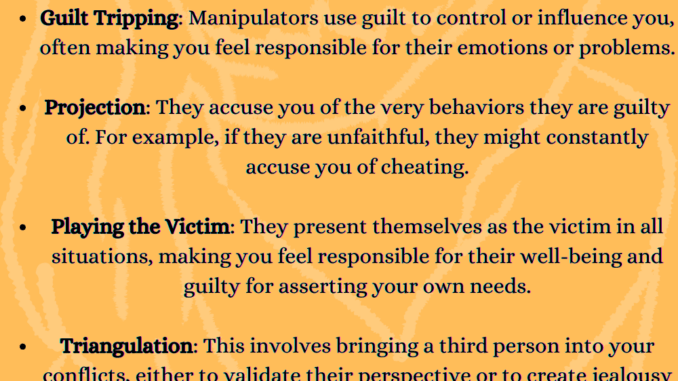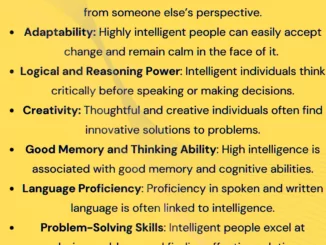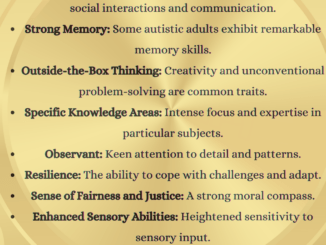
Untangling the Web: Psychological and Emotional Manipulation
Psychological and emotional manipulation are tactics used to control another person’s thoughts, feelings, and behaviors. Unlike healthy persuasion, manipulation seeks to gain power and benefit at someone else’s expense. It can be a subtle or blatant force in our lives, affecting our relationships, self-esteem, and overall well-being.
List of Manipulative Behaviors
Manipulators employ a range of tactics to achieve their goals. Here are some common ones:
- Lying and deception: Twisting facts, withholding information, or outright fabricating stories to confuse and control the narrative.
- Guilt-tripping: Making someone feel responsible for negative emotions or outcomes to coerce them into compliance.
- Emotional blackmail: Threatening to withdraw affection, support, or even self-harm if their demands aren’t met.
- Gaslighting: Denying reality, making someone question their own perceptions and sanity.
- Playing the victim: Portraying themselves as helpless or wronged to elicit sympathy and deflect blame.
- Love-bombing: Showering someone with excessive affection and attention to create dependence.
- Isolating the target: Discouraging contact with friends and family to increase dependence on the manipulator.
- Negative reinforcement: Withholding approval or affection until the desired behavior is obtained.
Read Also:
Seeing Through the Fog: Signs of Manipulation in Relationships
Spot Manipulation: Signs, Stages & How to Deal with It
Signs of Psychological Manipulation
Psychological manipulation is a web of tactics used to control another person’s thoughts, feelings, and behaviors. It can be a subtle or blatant force in our lives, affecting our relationships, self-esteem, and overall well-being.
Here are some common signs of psychological manipulation:
- Feeling constantly on edge or anxious around someone.You may feel like you can’t relax or be yourself when you’re around a manipulative person. You may also feel like you’re constantly walking on eggshells, trying to avoid upsetting them.
- Questioning your own judgment and sanity. Manipulators are often good at gaslighting, which is a technique of making someone question their own reality. If you’re constantly second-guessing yourself or feeling like you can’t trust your own perceptions, it could be a sign that you’re being manipulated.
- Walking on eggshells to avoid upsetting the manipulator. As mentioned earlier, manipulators can make you feel like you’re constantly on edge. You may find yourself going to great lengths to avoid upsetting them, even if it means sacrificing your own needs or happiness.
- Feeling obligated to fulfill someone else’s needs at your own expense. Manipulators are often very good at making you feel guilty or obligated to do things for them. You may find yourself constantly putting their needs before your own, even if it’s causing you resentment or stress.
- Noticing a one-sided dynamic in a relationship. Healthy relationships are reciprocal. If you feel like you’re the only one who is ever giving in or making sacrifices, it could be a sign that you’re in a manipulative relationship.
If you’re recognizing some of these signs in your own life, it’s important to trust your gut and take steps to protect yourself. Talk to a trusted friend or family member, or seek professional help. You don’t deserve to be manipulated, and there are people who can help you get out of a manipulative situation.
Signs of Emotional Manipulation in Relationships
Emotional manipulation in relationships can be particularly damaging as it preys on our desire for love, connection, and intimacy.
Here are some key signs to watch out for:
Excessive Jealousy or Possessiveness: A partner who constantly monitors your whereabouts, questions your friendships with the opposite sex, or tries to isolate you from loved ones is likely using jealousy as a control tactic.
Constant Put-Downs and Criticism: A healthy relationship allows for constructive criticism, but a manipulator uses negativity to chip away at your self-esteem. They may constantly criticize your appearance, choices, or accomplishments.
Making You Responsible for Their Happiness: The manipulator portrays their happiness as entirely dependent on your actions. They may guilt-trip you or make you feel like you’re “walking on eggshells” to avoid upsetting them.
Threats and Coercion: They may use threats of ending the relationship, self-harm, or emotional withdrawal to get you to comply with their wishes. This creates a dynamic of fear and obligation.
Isolating You from Friends and Family: The manipulator may subtly discourage you from spending time with loved ones, creating a situation where they become your primary source of support and affection.
Love-Bombing Followed by Withdrawal: Initially showering you with affection and attention, they may suddenly become distant or cold if you don’t meet their expectations. This creates a confusing cycle of highs and lows, making you crave their approval.
Name-Calling and Insults: Derogatory language and insults are a clear sign of disrespect and emotional abuse.
Dismissive of Your Needs and Feelings: A healthy partner validates your feelings and tries to understand your perspective. A manipulator dismisses your concerns, belittles your emotions, or makes you feel like your needs are unimportant.
Playing the Victim: The manipulator portrays themselves as the victim in situations, deflecting blame and making you feel responsible for their problems.
Signs of Emotional Manipulation from Parents
Unfortunately, emotional manipulation can occur within families too. Here are some signs to watch out for in the way your parents interact with you:
Guilt Trips as Leverage: Do your parents frequently use guilt to control your behavior? Examples might be statements like “After all we’ve done for you…” or “You’re making me so disappointed/sad.”
Conditional Love and Affection: Is your parents’ love or approval contingent on your actions or achievements? Do you feel you have to “earn” their affection?
Constant Comparisons: Do your parents constantly compare you to siblings or other children, making you feel inadequate or like you’ll never measure up?
Burdening You with Their Needs: Do your parents rely on you for emotional support in a way that feels inappropriate for a child’s role? This can make you feel responsible for their happiness.
Disrespecting Your Boundaries: Healthy parents respect your developing independence and boundaries. Do your parents constantly criticize your choices, privacy needs, or boundaries?
Threatening to Withhold Support: Do your parents threaten to withhold financial support, privileges, or even contact if you don’t comply with their wishes?
Minimizing or Invalidating Your Feelings: Do your parents dismiss your emotions as unimportant or overdramatic? A healthy parent tries to understand and validate your feelings.
Taking Credit for Your Achievements: Do your parents downplay your accomplishments or take credit for your successes?
Isolating You from Others: Do your parents discourage healthy friendships or activities outside the family unit, creating dependence on them?
It’s important to remember that these are just signs, and family dynamics can be complex. However, if you recognize several of these behaviors, it might be a good idea to talk to a trusted adult, counselor, or therapist. They can help you understand the situation better and develop healthy coping mechanisms.
Signs of Narcissistic Manipulation
Narcissistic manipulators are particularly adept at controlling others. Their inflated sense of self-importance and lack of empathy make them prime candidates for using underhanded tactics to get what they want.
Here’s how to spot the signs of narcissistic manipulation:
Grandiosity and Self-Absorption: They constantly brag about their achievements, exaggerate their abilities, and crave admiration. Conversations tend to revolve around them and their interests.
Lack of Empathy: They struggle to understand or care about the feelings of others. They may belittle your emotions or dismiss your concerns.
Envy and Competitiveness: They are easily threatened by others’ success and may try to diminish your accomplishments.
Charm Offensive (Love Bombing): Initially, they may shower you with affection and flattery to gain your trust and devotion. However, this affection is often conditional and can disappear quickly.
Need for Control: They have a strong need to be in control of situations and people. They may be critical, demanding, and micromanaging.
Gaslighting and Projection: They twist reality, deny their wrongdoings, and project their own flaws onto you. This can make you question your own perceptions and sanity.
Victim Mentality: They portray themselves as the victim in situations and deflect blame onto others. They may use guilt trips or emotional manipulation to gain sympathy.
Exploiting Others for Personal Gain: They see people as objects to be used for their own benefit. They may take advantage of your kindness, generosity, or resources.
Lack of Accountability: They refuse to take responsibility for their actions and blame others for their mistakes.
Dismissive of Your Needs and Feelings: Similar to general emotional manipulation, they dismiss your concerns, make you feel unimportant, and prioritize their needs over yours.
Remember:
Being in a relationship with a narcissist can be emotionally draining and damaging to your self-esteem. If you recognize these signs, it’s crucial to prioritize your well-being. Consider seeking support from trusted friends, family, or a therapist who specializes in narcissistic abuse. You deserve healthy relationships that build you up, not tear you down.
Empowering Yourself: Breaking Free from Manipulation
Manipulation can be a pervasive force in our lives, impacting our relationships, self-esteem, and overall well-being. But the good news is, you don’t have to be a victim.
Here’s a roadmap to empower yourself and break free from manipulative tactics:
1. Educate Yourself: Knowledge is power. The more you understand the different manipulation tactics, the easier it is to spot them in your interactions with others. Read articles, watch videos, or even consult a therapist to gain a deeper understanding of manipulative behavior.
2. Trust Your Gut: Often, our intuition picks up on manipulative cues before our conscious mind does. If someone’s behavior makes you feel uneasy, anxious, or unheard, pay attention to those red flags.
3. Set Boundaries: Healthy boundaries are essential for protecting yourself from manipulation. Learn to say no confidently when pressured into something you’re uncomfortable with. This might involve setting boundaries around time, communication styles, or even physical touch.
4. Build a Support System: Surround yourself with people who respect you, validate your feelings, and uplift you. Having a trusted network of friends, family, or a therapist can provide invaluable support as you navigate breaking free from manipulation.
5. Prioritize Self-Care: Taking care of yourself emotionally and physically strengthens your resilience against manipulation. Engage in activities you enjoy, practice relaxation techniques, and prioritize getting enough sleep. A strong sense of self-worth makes you less susceptible to manipulation.
6. Consider Professional Help: A therapist can equip you with specific strategies for dealing with manipulators. They can also help you process any emotional damage caused by past manipulation and build healthier relationship patterns.



1 Trackback / Pingback
Comments are closed.